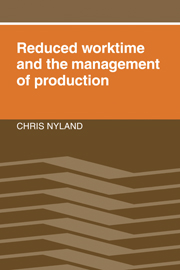4 - The rationalisation of worktime
Published online by Cambridge University Press: 25 March 2010
Summary
To show that the accelerated rate at which working times have fallen during the twentieth century has been accompanied by higher levels of work intensity and that much of the gain workers have attained by the temporal reduction has been offset by the greater intensity of modern working times raises the question of how such rapid intensification was brought about. This issue will now be looked at, and it will be argued that the crucial factor inducing this development has been the rationalisation of the production process that has occurred this century. The term “rationalisation” originated in Germany and was defined by the Committee on Industry of the World Economic Conference held in Geneva in 1927 as
the methods of technique and of organisation designed to secure the minimum waste of either effort or material. It includes the scientific organisation of labour, standardisation both of material and of products, simplification of processes and improvements in the system of transport and marketing.
(League of Nations 1927: 41)In the United States the essence of this movement was known as scientific management or Taylorism. It is the contention of this work that Taylorism was a phenomenon that has been greatly misunderstood and its significance underrated by modern scholars. The extent to which the rationalisation process proved to be a powerful force rejuvenating a decaying capitalism has not been sufficiently appreciated. This failure, it needs to be added, was not shared by the labour and socialist movements of the 1920s, the period during which scientific management became established as an international phenomenon.
- Type
- Chapter
- Information
- Reduced Worktime and the Management of Production , pp. 99 - 155Publisher: Cambridge University PressPrint publication year: 1989
- 1
- Cited by



